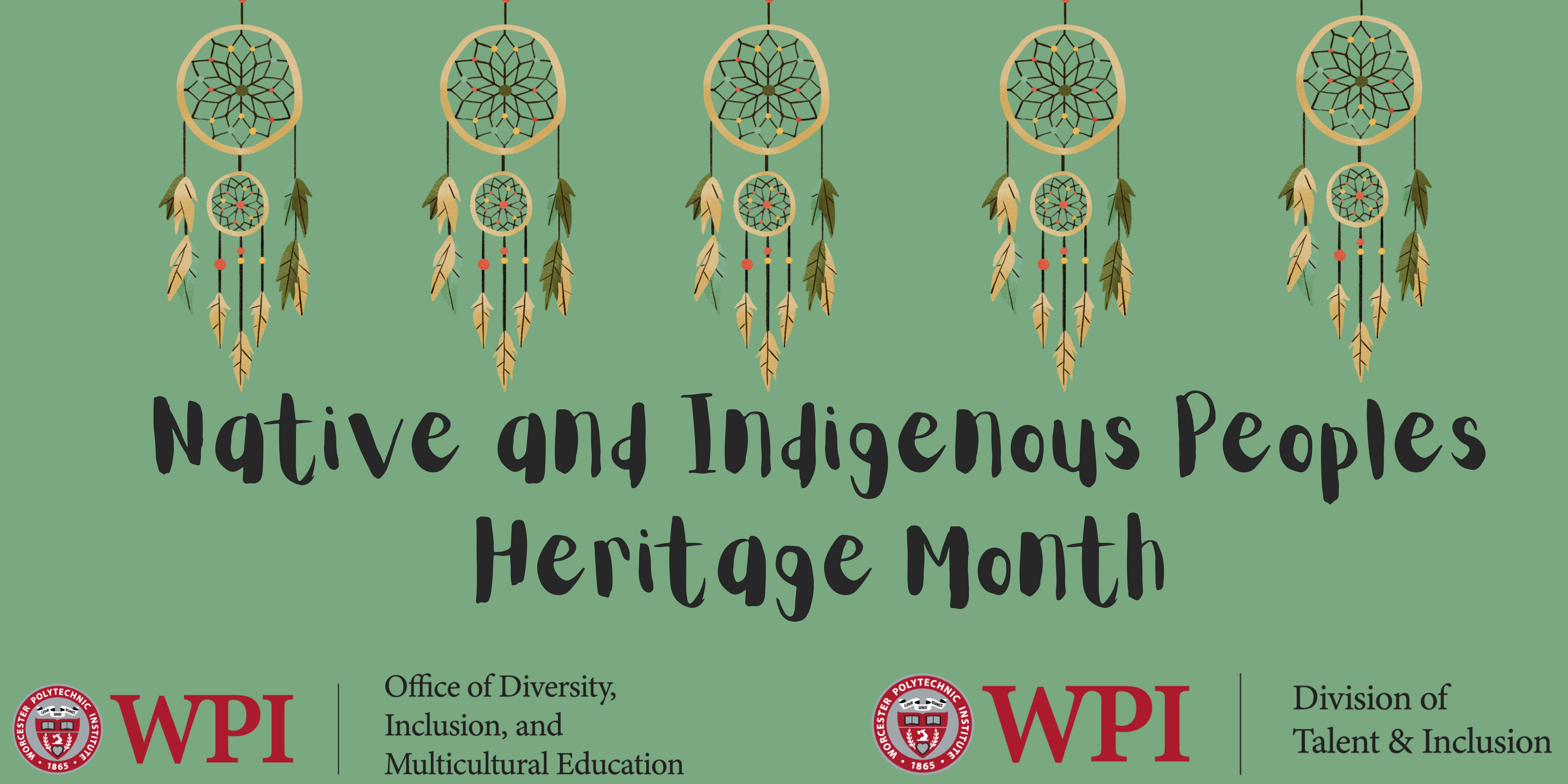WPI Celebrates Native and Indigenous Peoples Heritage Month 2023

Worcester Polytechnic Institute (WPI) has marked Native and Indigenous Peoples Heritage Month with a tribute to the rich tapestry of culture, heritage, and invaluable contributions of the Indigenous and Native community across time. What initially began as a week-long acknowledgment has flourished into a month-long commemoration, now a tradition for over three decades. We urge our community to explore, engage, celebrate, and honor the Native and Indigenous community, both on our campus and within the broader Worcester community and beyond.
In 1916, New York declared an “American Indian Day” to acknowledge the many contributions and achievements of Native and Indigenous peoples. Other states would later join New York in its efforts to give recognition to the community. As part of the nation’s bicentennial commemoration, President Gerald Ford was authorized by the S.J. Res. 209 to proclaim the October 10th – 16th of 1976 as “Native American Awareness Week.” Later on, congress passed S.J. Res. 390, which requested that the president designate November 23rd – 30th of 1986 as “American Indian Week.” Congress continued the practice of declaring one week of autumn as “Native American Indian Heritage Week.”
In 1990, President George H. W. Bush legally approved a joint resolution congress passed to designate the month of November as the first “National American Indian Heritage Month.” Note that the month is also known as “Native and Indigenous Peoples Heritage Month.” In 2008, the commemorative language was modified to be more inclusive for the Indigenous people located in Alaska.
STEM Scholar Highlights:
- Dr. Fred Begay, Nuclear Physicist
- Affiliation: Navajo
- Ella Cara Deloria, Anthropology
- Affiliation: Yankton Dakota
- Dr. John Bennett Herrington, NASA Astronaut
-
Affiliation: Chickasaw Nation
Read, Watch, Listen
- Learn how to respectfully address Native and Indigenous people by reading this short article: Native American vs. American Indian: Which Is Preferred? (healthline.com)
- Read 21 things you can do to be more respectful of Native American cultures – Nonprofit AF
- Explore Gordon Library’s Native and Indigenous Peoples Heritage Month Collection
- Explore the National Museum of the American Indian online
- Watch the 2022 Native Cinema Showcase between November 18-25, 2022
- An annual celebration of the best in Indigenous film. The online program features 35 films, represents 30 Native nations across the span of 8 countries, and 10 Indigenous languages spoken.
- Watch Gather documentary (2020)
- A film that explores the growing movement amongst Native Americans to reclaim their spiritual, political, and cultural identities through food sovereignty.
- Watch “Bury My Heart on Wounded Knee” film
- Watch “The Education of Little Tree” movie
- If you are a member of the Native and Indigenous community, please visit Natives Rising for mentorship, networking, job placement assistance, and more.
- Read “Celebrating National Native American Heritage Month”
- Listen to podcasts that explore Indigenous community, culture, and conversation:
- Native Trailblazers podcast
- Unreserved podcast
- Pow Wow Life podcast
Act
- Join WPI’s Society for Advancement of Chicanos/Hispanics and Native Americans in Science (SACNAS) Chapter
- Join us in celebration with Aquinnah Wampanoag Artist Elizabeth-James Perry on Friday, November 17 between 1:00 p.m.-2:00 p.m. in the OASIS House (20 Schussler Road) to create crafts and to learn about Native arts. The artist will also bring their wampum jewelry.
- Support the Worcester Inter-Tribal Indian Center
- Support the Massachusetts Center for Native American Awareness
- Support the American Indian Science and Engineering Society (AISES)
- Support Sisterhood of Native American Coders (SONAC)
- Support Native arts and businesses by buying art, jewelry, clothing, and other items made by Native people and communities.
- Register to Vote -OR- Check Your Voter Registration
- Everything you need to vote. Vote.org
"The voices of Native and Indigenous peoples are the echoes of wisdom, reminding us of our responsibility to protect and cherish our planet and its diverse cultures."
WPI Land acknowledgement:
WPI acknowledges the painful history of genocide in the U.S. for native and indigenous peoples. As a public statement that honors the indigenous people as native inhabits on this land, WPI honors and respects the many and diverse tribal nations who were forcefully removed from their sacred lands.
WPI would like to recognize the people of the Chaubunagungamaug and Hassanamisco Nipmuc Tribe as the traditional custodians of the land on which we work. We take this moment to honor their elders, past, present, and emerging. WPI strongly advocates for higher education professionals to honor the land, the original tribal occupants, and the history of where they are located.